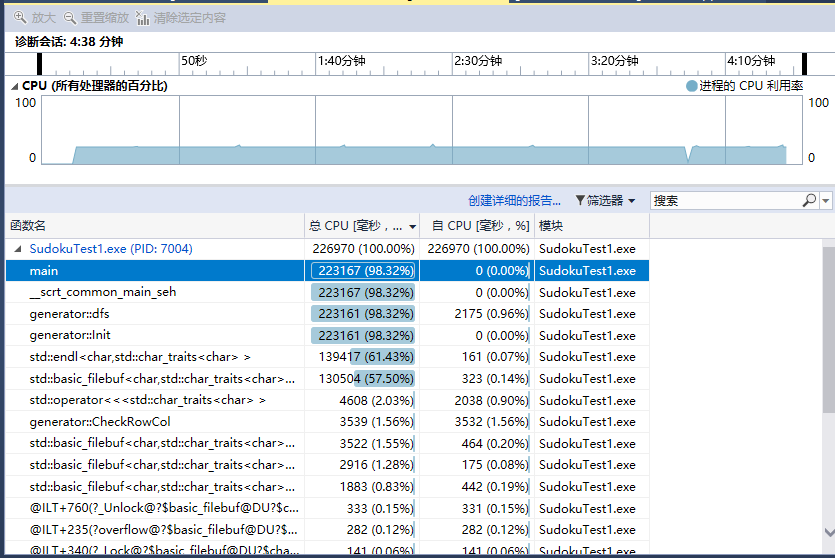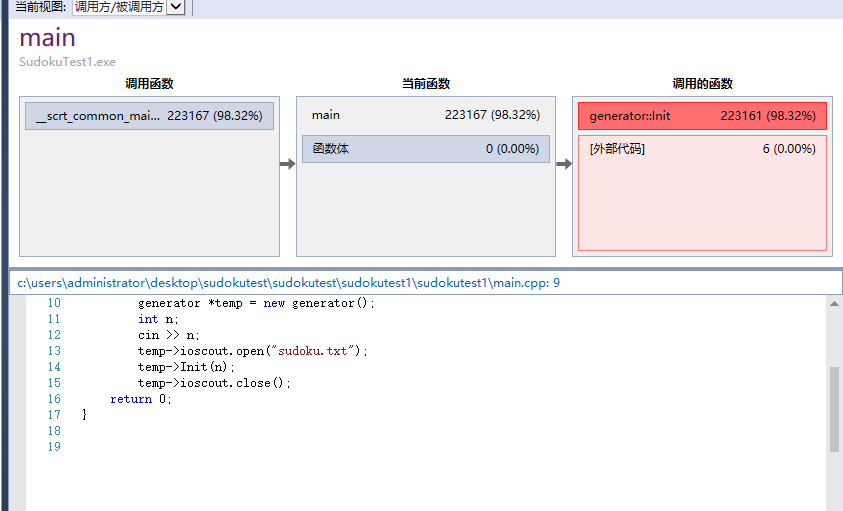软工实践第二次作业
项目准备
vs的安装(参考了别人的安装教程)
重新熟悉了一下c++工程的设计过程(主要参照之前计算机的写法)
解题思路
1)随机数法
这个是我在网上查找找到的方法,主要是通过一个已知的完全的数独矩阵,进行多种多次的矩阵变换。但是这种写法不符合作业的要求,首先是作业要求第一个空为学号%9+1,这就使得矩阵变化情况减少了很多,而且作业要求数独的不同情况为100w种,我想到这个数量级就放弃了
2)暴力的dfs
我的第一个想法其实是采用dfs的方法,进行行,列,宫的比较来进行所谓的试根法。这个思想还是比较容易实现的,而且代码量也比较少
解题过程
第一次尝试很快写好了代码,但是我运行的时候一直死循环,最后把每次试根的矩阵打印出来,才发现每次的回溯没有记录之前填入的值。每次试根都是从头(1)、开始尝试,造成了一直是不能继续往下的那个根在那边一直重复。
下面是失败的代码:
void next(int row, int col){
++col;
if(col >= 10){
col = 1;
++row;
}
dfs(row, col);
}
void back(int row, int col){
--col;
if(col <= 0){
--row;
col = 9;
}
temp[array[row][col]] = true;
dfs(row , col);
}
bool all_num = true;
for(int i = 1; i < 10; i++){
if(flag[i] == false || temp[i] == true) continue;
array[row][col] = i;
temp[i] = true;
all_num = false;
for(int i = 1; i <= 9; ++i){
for(int j = 1; j <= 9; ++j){
cout << array[i][j];
}
cout << endl;
}
next(row, col);
if(all_num){
array[row][col] = 0;
back(row, col);
}
cout << "The End" << endl;
}
死循环,无法继续
第二次看了一下网上的代码,采用的是三个数组分别判断是否符合,然后用1~9的循环来进行试根,避免一个根进行多次不必要的dfs
这里是判断(行,列,宫判断)
bool generator::CheckRowCol(int row, int col) {
// 行比较
if (Row[row][sudoku[row][col]] == true) return false;
// 列比较
if (Col[col][sudoku[row][col]] == true) return false;
// 宫比较
if (Palace[getPalace[row][col]][sudoku[row][col]] == true) return false;
return true;
}
主要的dfs
void generator::dfs(int row, int col) {
if (row == 9 && col == 9) {
++cnt;
//ioscout << "No." << cnt << " output :" << endl;
Print();
if (cnt == n) {
exit(0);
}
return;
}
if (row == 1 && col == 1) {
sudoku[1][1] = (2 + 8) % 9 + 1;
Row[1][sudoku[1][1]] = true;
Col[1][sudoku[1][1]] = true;
Palace[1][sudoku[1][1]] = true;
}
++col;
if (col > 9) {
++row;
col = 1;
}
for (int i = 1; i<10; i++) {
sudoku[row][col] = i;
if (!CheckRowCol(row, col)) continue;
Row[row][sudoku[row][col]] = true;
Col[col][sudoku[row][col]] = true;
Palace[getPalace[row][col]][sudoku[row][col]] = true;
dfs(row, col);
Row[row][sudoku[row][col]] = false;
Col[col][sudoku[row][col]] = false;
Palace[getPalace[row][col]][sudoku[row][col]] = false;
}
sudoku[row][col] = 0;
return;
}
PSP表格
| PSP2.1 | Personal Software Process Stages | 预估耗时(分钟) | 实际耗时(分钟) |
|---|---|---|---|
| Planning | 计划 | 30 | 30 |
| · Estimate | · 估计这个任务需要多少时间 | 20 | 30 |
| Development | 开发 | 500 | 800 |
| · Analysis | · 需求分析 (包括学习新技术) | 120 | 360 |
| · Design Spec | · 生成设计文档 | 0 | 0 |
| · Design Review | · 设计复审 (和同事审核设计文档) | 0 | 0 |
| · Coding Standard | · 代码规范 (为目前的开发制定合适的规范) | 10 | 30 |
| · Design | · 具体设计 | 60 | 80 |
| · Coding | · 具体编码 | 60 | 60 |
| · Code Review | · 代码复审 | 120 | 360 |
| · Test | · 测试(自我测试,修改代码,提交修改) | 60 | 120 |
| Reporting | 报告 | 30 | 30 |
| · Test Report | · 测试报告 | 30 | 30 |
| · Size Measurement | · 计算工作量 | 20 | 20 |
| · Postmortem & Process Improvement Plan | · 事后总结, 并提出过程改进计划 | 10 | 8 |
| 合计 | 1070 | 1936 |
性能分析
下面是运行100w的性能分析


主要在dfs上花费了太多时间
代码覆盖率
代码覆盖率目前还找不到工具分析,之后会更新



